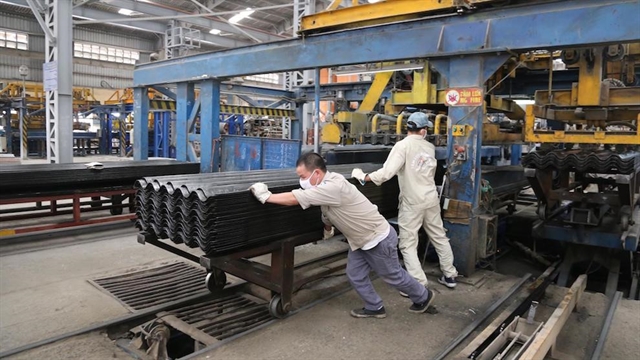The Ha Noi Small- and Medium-sized Enterprises Association (Hanoisme) has proposed Ha Noi to cut land rent by 50 per cent in the first half of this year for enterprises struggling due to the novel coronavirus (COVID-19) pandemic.

The Ha Noi Small- and Medium-sized Enterprises Association (Hanoisme) has proposed Ha Noi to cut land rent by 50 per cent in the first half of this year for enterprises struggling due to the novel coronavirus (COVID-19) pandemic.
Mac Quoc Anh, Hanoisme deputy chairman, said that the association has collected recommendations from enterprises in the city to cope with the pandemic.
The association has also proposed the People's Committee of Ha Noi to promote administrative reform for businesses.
The municipal authority should promote investment in industrial clusters, so enterprises have land for expanding production and business.
It also needs to reduce the number of specialised inspections for enterprises, excluding firms with violations, said Quoc Anh, adding that it should increase trade promotion programmes to boost consumption of goods.
Moreover, the city needs to reduce electricity and water prices, and other fees relating to production and business activities. It would increase market information and forecasts for the businesses.
The association has suggested the Government reduce corporate income tax to 15 to 17 per cent and extend payment deadlines for the tax.
It should cut value added tax (VAT) by 50 per cent until the end of the second quarter this year. It also needs to extend payment deadlines for VAT for imported goods to 120-180 days instead of paying the tax when enterprises implement customs procedures.
The State needs to reduce social insurance and health insurance premiums of labourers and extend payment deadlines for the premiums.
Meanwhile, banks need to extend payment deadlines for debt and reduce or exempt interest rates on loans. They should reduce conditions in providing loans for enterprises and accelerate the process of reviewing lending requests and disbursing capital, he said.
According to the association, Ha Noi’s tourism and service industries have suffered the greatest impact from the COVID-19 pandemic because the three key markets of Ha Noi’s tourism sector are China, South Korea and Japan, accounting for nearly 40 per cent of tourists coming to the city. Those three countries are facing a big challenge from the COVID-19 pandemic.
Industrial production has also struggled, as the sector exports 50 per cent of goods to China, South Korea and Japan, and 30 per cent of import material come from those three countries.
The Hanoisme deputy chairman said according to businesses in Ha Noi, the enterprises have just enough material for production until the end of the first quarter this year. After that, they are likely to reduce or suspend production due to shortages.
There are difficulties in finding alternative materials because customers will specify the suppliers of raw materials for up to 80 per cent of their orders so Vietnamese businesses cannot change the suppliers.
If they are permitted to change material suppliers, they can have new suppliers from India, Indonesia, Japan and Bangladesh but they must take time to negotiate with them and pay higher prices for the new resources, leading to reduced competitiveness, he said. — VNS





